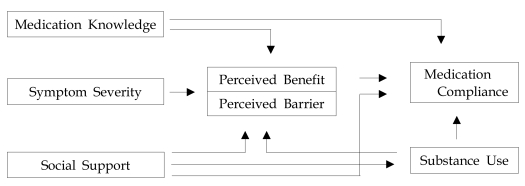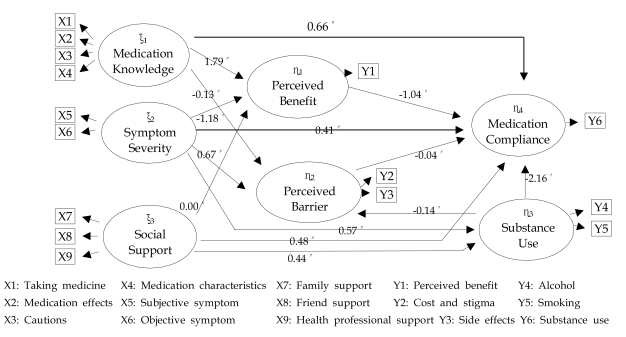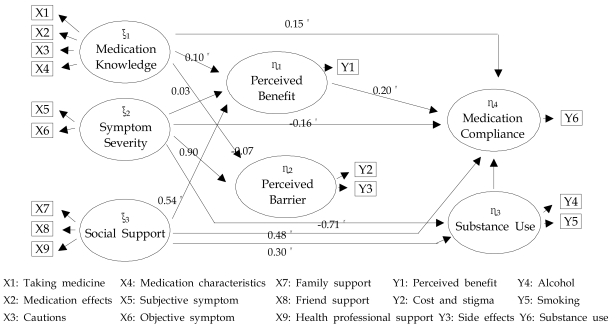Yonsei Med J.
2005 Jun;46(3):331-340. 10.3349/ymj.2005.46.3.331.
Development of a Structural Model Explaining Medication Compliance of Persons with Schizophrenia
- Affiliations
-
- 1Department of Social Welfare, Seoul Cyber University, Seoul, Korea. sma5014@iscu.ac.kr
- 2Department of Psychiatry, Yonsei University College of Medicine, Seoul, Korea.
- KMID: 1734066
- DOI: http://doi.org/10.3349/ymj.2005.46.3.331
Abstract
- The purpose of this study was to develop and test a structural model explaining medication compliance of schizophrenia. From a review of the literature, a hypothetical model was developed based on the conceptual framework of the Health Belief Model with medication knowledge, symptom severity and social support as the exogenous variables, and perceived benefits, perceived barriers, substance use and medication compliance as the endogenous variables. Data was collected at various mental health facilities, including psychiatric outpatient clinics of general hospitals and community mental health centers, between March and May, 2001. A structured questionnaire was used by one- on- one interviews to collect data on 208 schizophrenic patients. Well established measurement instruments, with confirmed reliability, were used to assess each method variable. As a result of covariance structural analysis, the hypothetical model was found not to fit the empirical data well, so a parsimonious model was adopted after modifying the model. The final model was able to explain the 33% medication compliance. Medication knowledge, social support and perceived benefits had significant effects on medication compliance. The findings of this study address the importance of medication education and social support to promote medication compliance. It is also suggested that various education programs and support groups are needed to enhance medication compliance.
Keyword
MeSH Terms
Figure
Reference
-
1. Ruscher SM, Wit R, Mazmanian D. Psychiatric patients' attitudes about medication and factors affecting noncompliance. Psychiatr Serv. 1997; 48:82–85. PMID: 9117506.2. Kissling W. Ideal and reality of neuroleptic relapse prevention. Br J Psychiatry Suppl. 1992; 161:133–139. PMID: 1356363.
Article3. Bond WS, Hussar DA. Detection methods and strategies for improving medication compliance. Am J Hosp Pharm. 1991; 48:1978–1988. PMID: 1928147.
Article4. Oh HJ. The burden and professional help for the family of the mental illness. J Korean Acad Nurs. 2000; 30:202–212.5. Harvey NS, Peet M. Lithium maintenance: Effects of personality and attitude on health information acquisition and compliance. Br J Psychiatry. 1991; 158:200–204. PMID: 2012911.6. Drain J, Solomon P. Explaining attitudes toward medication compliance among a seriously mentally ill population. J Nerv Ment Dis. 1994; 182:50–54. PMID: 8277302.7. Schwartz RC, Skaggs JL, Peterson S. Critique of recent empirical research on insight and symptomology in schizophrenia. Psychol Rep. 2000; 86:471–474. PMID: 10840897.8. Gao X, Nau DP, Rosenbluth VS, Woodward C. The relationship of disease severity, health beliefs and medication adherence among HIV patients. AIDS Care. 2000; 12:387–398. PMID: 11091771.
Article9. Scott CS, Lore C, Owen RG. Increasing medication compliance and peer support among psychiatrically diagnosed students. J Sch Health. 1992; 62:478–480. PMID: 1289660.
Article10. Buchanan A. A two-year prospective study of treatment compliance in patients with schizophrenia. Psychol Med. 1992; 22:787–797. PMID: 1357703.
Article11. Razali MS, Yahya H. Compliance with treatment in schizophrenia: A drug intervention program in a developing program. Acta Psychiatr Scand. 1995; 91:331–335. PMID: 7639089.12. Shon KH. A comparative study on relationship of social support, life events, and depression between psychiatric patients and normal subjects. Nurs Science. 1997; 9:59–86.13. Adams J, Scott J. Predicting medication adherence in severe mental disorders. Acta Psychiatr Scand. 2000; 101:119–124. PMID: 10706011.
Article14. Budd RJ, Hughes I, Smith JA. Health beliefs and compliance with antipsychotic medication. Br J Clin Psychol. 1996; 35:393–397. PMID: 8889080.
Article15. Janz NK, Becker MH. The Health belief model: A decade later. Health Educ Q. 1984; 11:1–47. PMID: 6392204.
Article16. Fenton WS, Blyler CR, Heinssen RK. Determinants of medication compliance in schizophrenia: Empirical and clinical findings. Schizophr Bull. 1997; 23:637–651. PMID: 9366000.
Article17. Richardson MA, Simons-Morton B, Annegers JF. Effect of perceived barriers on compliance with antihypertensive medication. Health Educ Q. 1993; 20:489–503. PMID: 8307768.
Article18. Reiger DA, Farmer ME, Rae DS. Comorbidity of mental disorders with alcohol and other drug abuse. JAMA. 1990; 264:2511–2518. PMID: 2232018.
Article19. Lee CS, Han ES, Hwang TY. Public mental health and community: psychosocial rehabilitation program for mentally ill. 1996. Kyoungido: Yongin psychiatric hospital.20. Becker MH. The health belief model and personal health behavior. Health Educ Mono. 1974; 2:324–473.21. Harber J, Krainovich-Miller B, McMahon LA, Price-Hoskins P. Comprehensive Psychiatric Nursing. 1996. 5th ed. St. Louis: Mosby.22. Overall JE, Gorham DR. The brief psychiatric rating scale. Psychol Rep. 1962; 10:799–812.
Article23. Sarason IG. The social support questionnaire. Measuring health: A guide to rating scales and questionnaires. 1983. New York: Oxford Univ. Press;p. 867–869.24. Moon JS. A study of instrument development for health belief of Korean adults[dissertation]. 1990. Seoul: Yonsei Univ..25. Korean Ministry of Culture and Athlete. Current status of adolescent drug misuse and prevention strategies. 1996. Ministry of culture and athlete press.26. Cho SB. LISREL structural equation model. 1996. Seoul: Young-Ji Press.27. Hwang MS. The effects of medication education to schizophrenia patients medication knowledge and medication compliance[dissertation]. 1998. Seoul: Yonsei Univ..28. Collins-Colon T. Do it yourself: Medication management for community based clients. J Psychosoc Nurs Ment Health Serv. 1990; 28:25–29. PMID: 2366218.29. Ku MO, Lee EO. Health belief model and Korean chronic patients' sick role. J Korean Academy. 1990; 29:49–63.30. Shon KH, Park SS. Medication and symptom management education program for the rehabilitation of psychiatric patients in Korea: the effects of promoting schedule on self-efficacy theory. Yonsei Med J. 2002; 43:579–589. PMID: 12402370.
Article31. Kim BY, Lee CW, Park CW. The relationship among insight, psychopathology and drug compliance in the schizophrenic patient. J Korean Neuropsychiatric Association. 1993; 32:373–380.32. Perkins DO. Adherence to antipsychotic medications. J Clin Psychiatry. 1999; 60:25–30. PMID: 10548139.33. Owen RR, Fischer EP, Booth BM, Cuffel BJ. Medication noncompliance and substance abuse among patients with schizophrenia. Psychiatr Serv. 1996; 47:853–858. PMID: 8837158.34. Olfson M, Mechanic D, Hansell S, Boyer AC, Walkup J, Weiden PJ. Predicting medication noncompliance after hospital discharge among patients with schizophrenia. Psychiatr Serv. 2000; 51:216–222. PMID: 10655006.
Article35. Pristach CA, Smith CM. Medication compliance and substance abuse among schizophrenia patients. Hosp Community Psychiatry. 1990; 41:1345–1348. PMID: 1980483.
- Full Text Links
- Actions
-
Cited
- CITED
-
- Close
- Share
- Similar articles
-
- Effectiveness of an 'Integrated Medication Adherence Enhancement Program for Persons with Schizophrenia' by Using Online Education Contents
- Medication Compliance in Psychiatric Outpatients of a University Hospital
- Antipsychotic Compliance and Maintenance Dosage in Admitted Patients with Schizophrenia Who had been Followed Up Over 6 Months
- Issues of Compliance in Osteoporosis Medication
- A Structural Equation Model Explaining Contraception Behaviors of Married Korean Women




